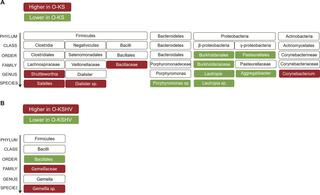当前位置:
X-MOL 学术
›
PLOS Pathog.
›
论文详情
Our official English website, www.x-mol.net, welcomes your
feedback! (Note: you will need to create a separate account there.)
Signatures of oral microbiome in HIV-infected individuals with oral Kaposi's sarcoma and cell-associated KSHV DNA.
PLoS Pathogens ( IF 5.5 ) Pub Date : 2020-01-17 , DOI: 10.1371/journal.ppat.1008114 Marion Gruffaz 1 , Tinghe Zhang 2 , Vickie Marshall 3 , Priscila Gonçalves 4 , Ramya Ramaswami 4 , Nazzarena Labo 3 , Denise Whitby 3 , Thomas S Uldrick 4, 5 , Robert Yarchoan 4 , Yufei Huang 2, 6 , Shou-Jiang Gao 1, 7
PLoS Pathogens ( IF 5.5 ) Pub Date : 2020-01-17 , DOI: 10.1371/journal.ppat.1008114 Marion Gruffaz 1 , Tinghe Zhang 2 , Vickie Marshall 3 , Priscila Gonçalves 4 , Ramya Ramaswami 4 , Nazzarena Labo 3 , Denise Whitby 3 , Thomas S Uldrick 4, 5 , Robert Yarchoan 4 , Yufei Huang 2, 6 , Shou-Jiang Gao 1, 7
Affiliation

|
Infection by Kaposi's sarcoma-associated herpesvirus (KSHV) is necessary for the development of Kaposi's sarcoma (KS), which most often develops in HIV-infected individuals. KS frequently has oral manifestations and KSHV DNA can be detected in oral cells. Numerous types of cancer are associated with the alteration of microbiome including bacteria and virus. We hypothesize that oral bacterial microbiota affects or is affected by oral KS and the presence of oral cell-associated KSHV DNA. In this study, oral and blood specimens were collected from a cohort of HIV/KSHV-coinfected individuals all previously diagnosed with KS, and were classified as having oral KS with any oral cell-associated KSHV DNA status (O-KS, n = 9), no oral KS but with oral cell-associated KSHV DNA (O-KSHV, n = 10), or with neither oral KS nor oral cell-associated KSHV DNA (No KSHV, n = 10). We sequenced the hypervariable V1-V2 region of the 16S rRNA gene present in oral cell-associated DNA by next generation sequencing. The diversity, richness, relative abundance of operational taxonomic units (OTUs) and taxonomic composition of oral microbiota were analyzed and compared across the 3 studied groups. We found impoverishment of oral microbial diversity and enrichment of specific microbiota in O-KS individuals compared to O-KSHV or No KSHV individuals. These results suggest that HIV/KSHV coinfection and oral microbiota might impact one another and influence the development of oral KS.
中文翻译:

患有口腔卡波西肉瘤和细胞相关 KSHV DNA 的 HIV 感染者的口腔微生物组特征。
卡波西肉瘤相关疱疹病毒 (KSHV) 的感染对于卡波西肉瘤 (KS) 的发展是必要的,卡波西肉瘤 (KS) 最常见于 HIV 感染者。 KS 经常有口腔表现,口腔细胞中可检测到 KSHV DNA。许多类型的癌症都与微生物组的改变有关,包括细菌和病毒。我们假设口腔细菌微生物群影响或受口腔 KS 和口腔细胞相关 KSHV DNA 的影响。在这项研究中,从一组先前诊断为 KS 的 HIV/KSHV 合并感染个体中收集了口腔和血液样本,并被分类为患有口腔 KS 且具有任何口腔细胞相关 KSHV DNA 状态的个体(O-KS,n = 9) ),无口腔 KS,但具有口腔细胞相关 KSHV DNA(O-KSHV,n = 10),或既不具有口腔 KS,又不具有口腔细胞相关 KSHV DNA(无 KSHV,n = 10)。我们通过下一代测序对口腔细胞相关 DNA 中存在的 16S rRNA 基因的高变 V1-V2 区域进行了测序。对 3 个研究组的操作分类单位 (OTU) 的多样性、丰富度、相对丰度和口腔微生物群的分类组成进行了分析和比较。我们发现,与 O-KSHV 或无 KSHV 个体相比,O-KS 个体的口腔微生物多样性减少,特定微生物群丰富。这些结果表明 HIV/KSHV 合并感染和口腔微生物群可能相互影响并影响口腔 KS 的发展。
更新日期:2020-01-17
中文翻译:

患有口腔卡波西肉瘤和细胞相关 KSHV DNA 的 HIV 感染者的口腔微生物组特征。
卡波西肉瘤相关疱疹病毒 (KSHV) 的感染对于卡波西肉瘤 (KS) 的发展是必要的,卡波西肉瘤 (KS) 最常见于 HIV 感染者。 KS 经常有口腔表现,口腔细胞中可检测到 KSHV DNA。许多类型的癌症都与微生物组的改变有关,包括细菌和病毒。我们假设口腔细菌微生物群影响或受口腔 KS 和口腔细胞相关 KSHV DNA 的影响。在这项研究中,从一组先前诊断为 KS 的 HIV/KSHV 合并感染个体中收集了口腔和血液样本,并被分类为患有口腔 KS 且具有任何口腔细胞相关 KSHV DNA 状态的个体(O-KS,n = 9) ),无口腔 KS,但具有口腔细胞相关 KSHV DNA(O-KSHV,n = 10),或既不具有口腔 KS,又不具有口腔细胞相关 KSHV DNA(无 KSHV,n = 10)。我们通过下一代测序对口腔细胞相关 DNA 中存在的 16S rRNA 基因的高变 V1-V2 区域进行了测序。对 3 个研究组的操作分类单位 (OTU) 的多样性、丰富度、相对丰度和口腔微生物群的分类组成进行了分析和比较。我们发现,与 O-KSHV 或无 KSHV 个体相比,O-KS 个体的口腔微生物多样性减少,特定微生物群丰富。这些结果表明 HIV/KSHV 合并感染和口腔微生物群可能相互影响并影响口腔 KS 的发展。









































 京公网安备 11010802027423号
京公网安备 11010802027423号